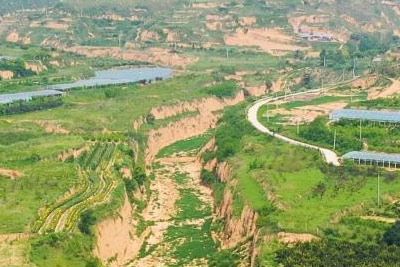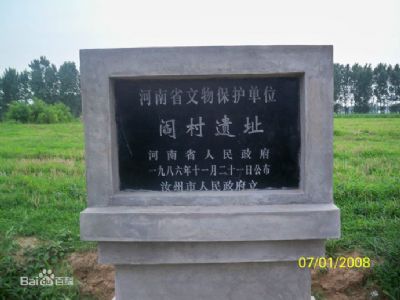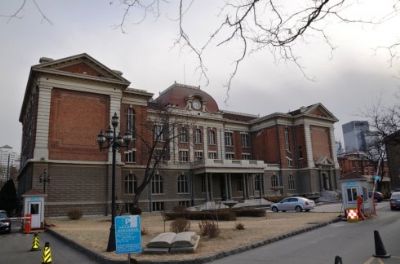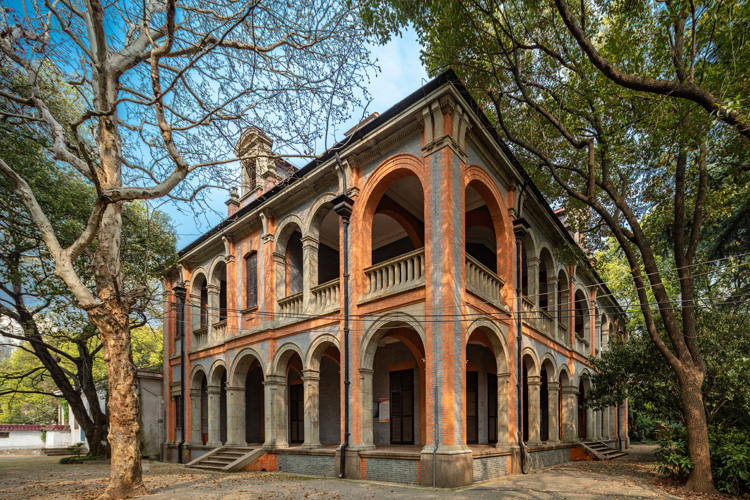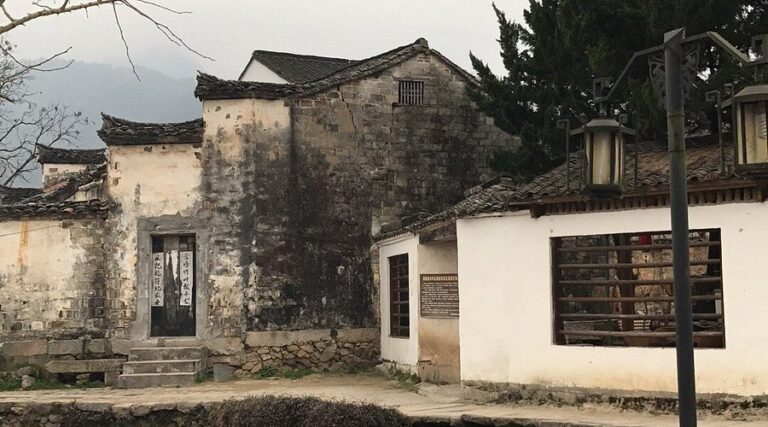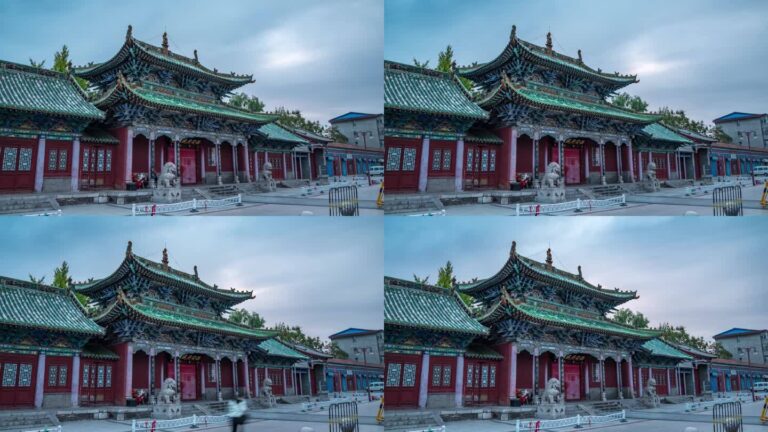Jiuquan Yulinku: Experience the Breathtaking Beauty of Gansu’s Natural Oasis
An Essential Guide to Visiting Jiuquan Yulinku
In This Guide
- An Essential Guide to Visiting Jiuquan Yulinku
- The Rich History of Jiuquan Yulinku
- Main Highlights: What to See at Jiuquan Yulinku
- Planning Your Visit: A Practical Guide
- Tickets, Hours, and Booking
- How to Get There
- Local Cuisine and Accommodation
- Frequently Asked Questions
- Final Thoughts on Your Trip
Nestled along the banks of the Yulin River in Gansu Province, the Yulinku (榆林窟), also known as the Yulin Grottoes, offers a serene yet captivating glimpse into China’s rich cultural tapestry. Often overshadowed by its more famous sibling, the Mogao Caves, Yulinku is a treasure trove of Buddhist art and history that beckons travelers seeking a quieter experience away from the bustling crowds.
Dating back to the Northern Wei Dynasty, these ancient caves were carved into the rugged cliffs of the Yulin River Gorge, showcasing a remarkable collection of frescoes and sculptures that span multiple dynasties, including the Tang, Song, and Western Xia. With 43 caves to explore, visitors are treated to intricate murals depicting scenes of Buddhist teachings, divine figures, and vivid narratives that reflect both the artistic prowess and spiritual devotion of the times.
One of the defining aspects of Yulinku is its intimate atmosphere. Unlike the often crowded Mogao Caves, Yulinku allows for a more personal exploration of its artistic wonders. The well-preserved frescoes, some of which are unique to this site, invite contemplation and admiration without the distraction of throngs of tourists. The walls come alive with stories of ancient monks and celestial beings, each brushstroke whispering secrets of a bygone era.
As you wander through the caves, the natural beauty surrounding Yulinku enhances the experience. The stunning contrast of the stark cliffs against the lush banks of the river creates a picturesque backdrop, perfect for reflection and photography. The tranquility of the region, combined with the profound historical significance of the site, makes a visit to Yulinku an enriching journey into the heart of China’s Buddhist heritage.
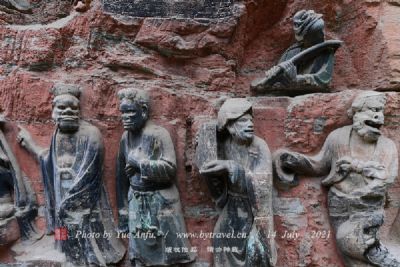
Jiuquan Yulinku.
Whether you’re a history buff, an art enthusiast, or simply in search of a peaceful escape, Yulinku promises a unique and unforgettable adventure. Prepare to be inspired by the artistry of the past, and allow yourself to be transported to a time when these caves served as sacred spaces for spiritual practice and artistic expression.
The Rich History of Jiuquan Yulinku
Nestled in the scenic hills of Gansu Province, the Yulinku Grottoes, also known as the Yulinkou or Wanfodong (万佛洞), represent a remarkable chapter in the history of Buddhist art in China. These grottoes, located approximately 70 kilometers south of the city of Jiuquan, serve as a significant counterpart to the more renowned Mogao Caves, often referred to as their “sister caves.”
The origins of Yulinku can be traced back to the Northern Wei Dynasty (386-535 AD), although some estimates suggest that the site may have been established even earlier, during the Sui or Tang dynasties. The caves were carved into the cliffs of the Yulin River Gorge, creating a dramatic backdrop that enhances their artistic and spiritual ambiance. Over the centuries, the site experienced significant artistic development, with numerous expansions and renovations occurring during the Tang, Song, Western Xia, Yuan, and Qing dynasties.
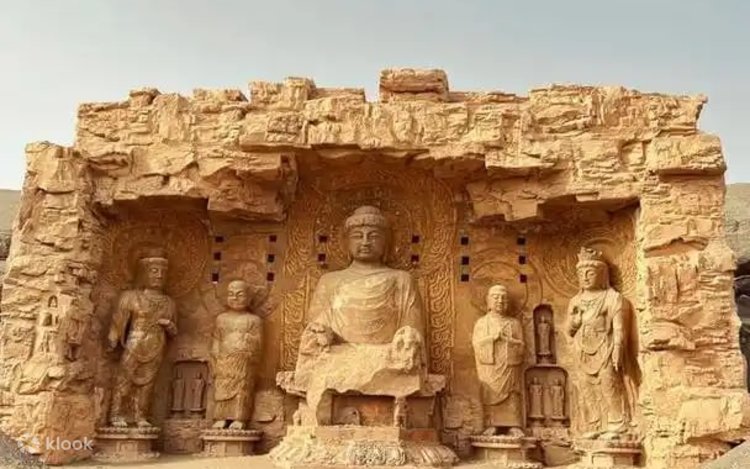
Jiuquan Yulinku.
While the Yulinku Grottoes do not boast the same scale as the Mogao Caves, which feature over 700 caves, Yulinku contains 43 well-preserved caves that showcase a wealth of Buddhist artwork. The frescoes and sculptures within these caves reflect the evolution of Buddhist iconography and artistic techniques over time. Notably, the murals from the Tang and Western Xia periods are especially prized for their intricate detail and vivid storytelling, depicting not only divine figures but also scenes of everyday life, offering a glimpse into the cultural and social contexts of the time.
One of the most striking features of Yulinku is its collection of murals, which spans various artistic styles and periods. The caves display a rich tapestry of Buddhist themes, including images of Bodhisattvas and elaborate narratives from Buddhist scriptures, all meticulously rendered. Furthermore, the site is known for unique representations that are not found in other grottoes, such as depictions of military figures from the Western Xia era and scenes from the famous journey of Xuanzang, the monk who traveled to India to retrieve Buddhist texts.
In recognition of its historical and artistic significance, the Yulinku Grottoes were designated as a key cultural heritage site by the State Council of the People’s Republic of China in 1961. Today, they are managed by the Dunhuang Academy, which oversees their preservation and promotes scholarly research.
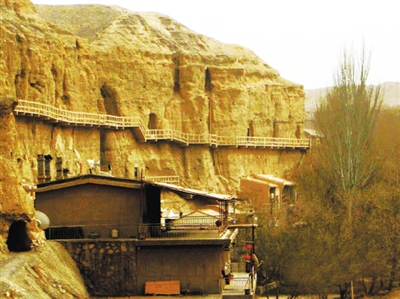
Jiuquan Yulinku.
Visiting Yulinku offers not only a chance to admire exquisite cave art but also an opportunity to reflect on the profound cultural exchanges that occurred along the ancient Silk Road. The grottoes stand as silent witnesses to centuries of spiritual devotion and artistic achievement, making them a must-visit destination for those interested in China’s rich historical tapestry.
Main Highlights: What to See at Jiuquan Yulinku
Nestled along the banks of the Yulin River, Jiuquan Yulinku, also known as the Yulin Grottoes, is a lesser-known gem that deserves a spot on every traveler’s itinerary, especially for those venturing into the rich cultural tapestry of China’s Gansu province. This enchanting site, often overshadowed by the more famous Mogao Caves, offers a unique glimpse into the artistry and spirituality of ancient Buddhist culture.
Historical Significance
Dating back to the Northern Wei Dynasty, the Yulin Grottoes consist of 43 caves carved into steep cliffs, showcasing a remarkable array of murals and sculptures. These caves were developed over several dynasties, including the Tang, Song, and Western Xia, with artistic styles reflecting the evolution of Buddhist iconography through the centuries. The grottoes are a vital part of the Silk Road’s historical narrative, serving as a spiritual sanctuary for travelers and monks alike.
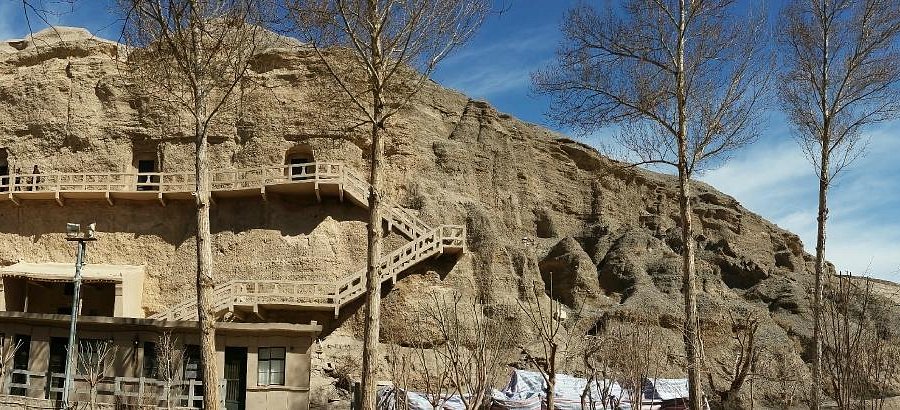
Jiuquan Yulinku.
Artistic Marvels
One of the main draws of Yulinku is its stunning frescoes, which are renowned for their intricate details and vibrant colors. Visitors can marvel at depictions of bodhisattvas, heavenly beings, and grand narratives from Buddhist texts. The artwork, particularly from the Tang and Western Xia periods, is celebrated for its clarity and expressive character, offering a vivid representation of the spiritual life of the time. Notably, the unique murals that portray the lives and legends of Buddhist figures set Yulinku apart from its more famous counterpart.
Serene Environment
Visiting Yulinku provides a chance to escape the crowds typically found at the Mogao Caves. The tranquil surroundings enhance the experience, allowing visitors to immerse themselves in the serene atmosphere that once inspired monks and artists. Strolling along the banks of the Yulin River, framed by the rugged desert landscape, visitors can appreciate the natural beauty that complements the artistic heritage of the grottoes.
Visitor Experience
A typical visit to the Yulin Grottoes lasts about 2-3 hours, giving ample time to explore the main caves and absorb the spiritual ambiance. Guided tours are available, providing insightful narratives that enrich the experience. The site is well-managed, ensuring a pleasant visit with minimal disruption, making it an ideal choice for those seeking a peaceful exploration of historical art.
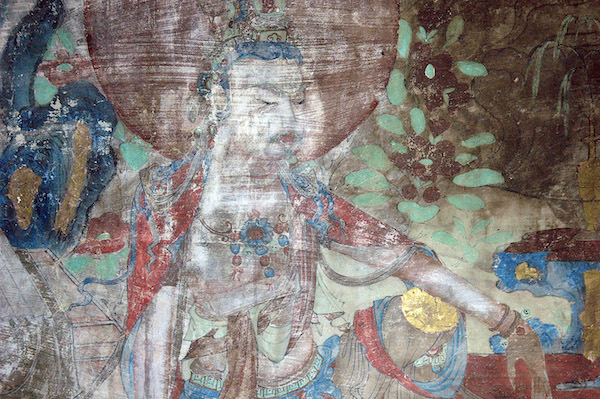
Jiuquan Yulinku.
Accessibility
Located approximately 70 kilometers south of Jiuquan city, Yulinku is easily accessible by car. The journey to the grottoes offers scenic views of the surrounding landscape, making the trip itself a delightful part of the adventure. With a modest entrance fee, Yulinku stands out as a cost-effective yet enriching experience for travelers in the region.
In summary, the Yulin Grottoes offer a captivating blend of historical significance, artistic brilliance, and natural tranquility. For those looking to delve deeper into the spiritual and cultural heritage of the Silk Road, a visit to Yulinku is an unmissable experience that promises to leave a lasting impression.
Planning Your Visit: A Practical Guide
When planning your visit to the Jiuquan Yulinku (榆林窟), an exquisite gem among China’s historical grottoes, here’s everything you need to know to make your trip smooth and enjoyable.

Jiuquan Yulinku.
Getting There
Yulinku is situated approximately 70 kilometers south of the city of Jiuquan in Gansu Province, alongside the Yulin River (also known as the Tashi River). The most convenient way to reach Yulinku is by car; if you are coming from Dunhuang, it takes around two hours to drive. Alternatively, you can take a bus from Jiuquan to Gua Zhou County, followed by a short taxi ride to the site.
Opening Hours and Ticket Prices
The grottoes are open from 9:30 AM to 5:00 PM. The entrance fee is approximately 40 RMB (around $6), which allows you to visit several of the main caves, including guided explanations. For a more in-depth experience, you can purchase tickets for special caves, ranging from 100 to 200 RMB, depending on the cave you wish to explore.
Recommended Time to Visit
Plan to spend about 2-3 hours at Yulinku. This will give you ample time to appreciate the stunning murals and sculptures, as well as the serene surroundings of the gorge.
What to Expect
Yulinku is less crowded than the renowned Mogao Caves, offering a more intimate experience with the art and history of the site. The caves date back to the Northern Wei period and feature a variety of artistic styles from the Tang, Song, and Western Xia dynasties. The rich murals depict Buddhist deities, historical scenes, and intricate floral patterns.
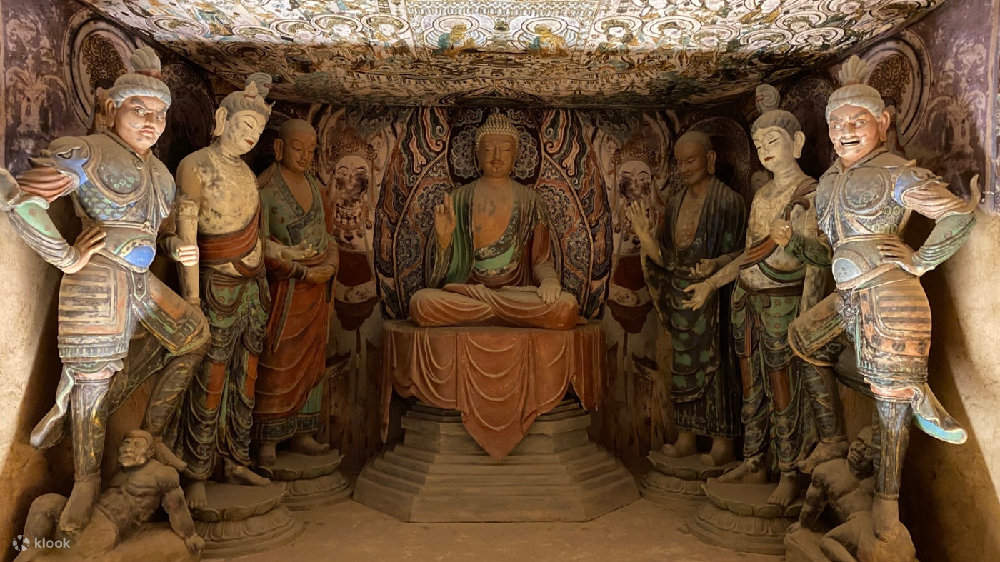
Jiuquan Yulinku.
Guided Tours
To fully appreciate the artistry and historical significance of Yulinku, consider joining a guided tour. The knowledgeable guides provide detailed insights into the stories behind the murals and the cultural context of the grottoes, making your visit much more enriching.
Nearby Attractions
While in the area, don’t miss other notable sites:
– Mogao Caves: Often referred to as Yulinku’s sister caves, this UNESCO World Heritage site is a must-visit for its vast collection of Buddhist art.
– Western Thousand Buddha Caves (西千佛洞): Located nearby, these caves offer additional insights into the region’s historical significance.
– Yumen Pass (玉门关): A historic site along the ancient Silk Road, perfect for those interested in the region’s rich history.
Food and Accommodation
While there are limited dining options in close proximity to Yulinku, you can find local dishes in Jiuquan. Try the famous donkey meat noodles or lamb hot pot for an authentic experience. For accommodation, staying in Jiuquan offers a range of hotels from budget to mid-range options. Ensure you book in advance, especially during peak tourist seasons.
Travel Tips
- Advance Booking: Reserve your tickets online ahead of time, especially for special caves, to avoid disappointment.
- Dress Comfortably: Wear comfortable shoes as you will be walking and exploring the caves.
- Weather Awareness: The region can experience significant temperature fluctuations. Dress in layers and bring sun protection, as the sun can be intense in the desert climate.
- Photography Restrictions: Note that photography is not allowed inside the caves to protect the delicate murals.
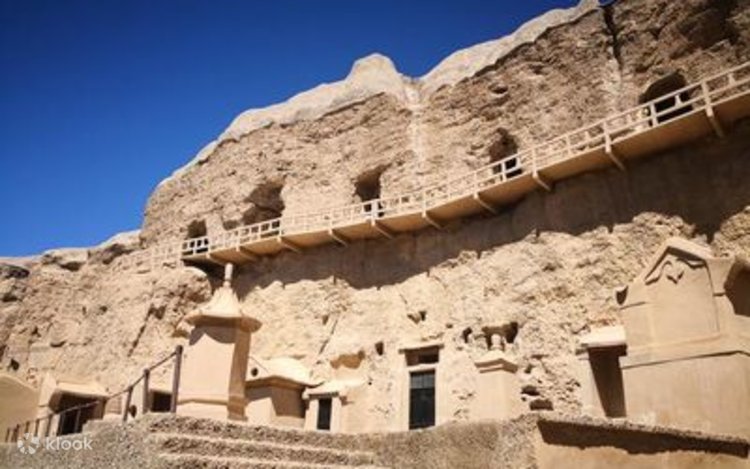
Jiuquan Yulinku.
Conclusion
Yulinku is an exceptional destination that beautifully captures the essence of ancient Buddhist art and culture. With the right preparation, your visit to this lesser-known grotto will undoubtedly be a highlight of your travels in Gansu Province. Enjoy your journey into history!
Tickets, Hours, and Booking
When planning your visit to the Yulin Grottoes (榆林窟), it’s essential to be aware of the ticketing details to ensure a smooth experience. The ticket prices are set at approximately 40 RMB (around 6 USD), which allows you access to explore up to five of the main caves. This price reflects great value, considering it includes guided commentary that enhances your understanding of the historical and artistic significance of the site.
For those looking for a more in-depth experience, special tickets are available for specific caves, known as “special caves.” The ticket prices for these range from 100 to 200 RMB (15 to 30 USD) depending on the cave selected. It’s advisable to purchase these tickets on-site as they can offer exclusive insights into the unique features of each grotto.
To avoid any hassle, especially during peak tourist seasons, it is recommended to book your tickets in advance through the official website or authorized ticketing platforms. This will not only save you time but also guarantee your entry, as certain caves have strict visitor limits, particularly the special ones.
The Yulin Grottoes are open from 9:30 AM to 5:00 PM, so plan your visit accordingly to make the most of your time. Given the rich history and the breathtaking artistry encapsulated within these grottoes, securing your tickets ahead of time will ensure that you have a memorable experience exploring this hidden gem in the Gansu province.
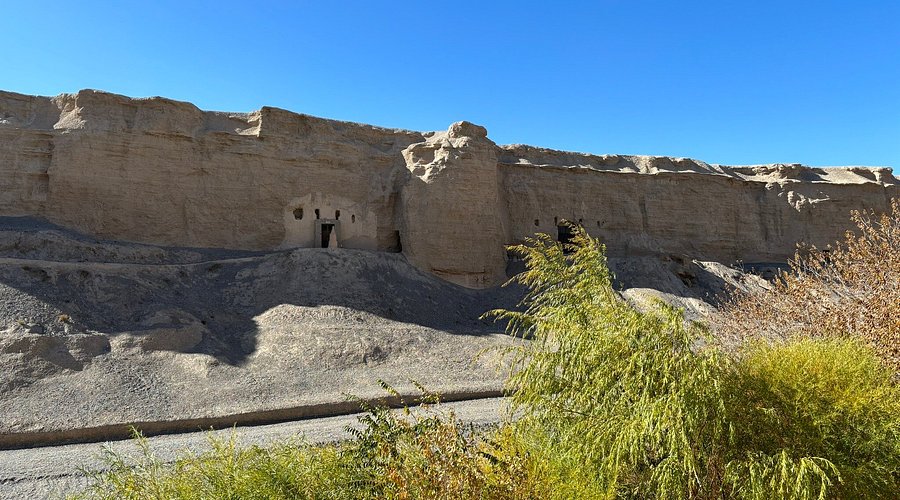
Jiuquan Yulinku.
How to Get There
Getting to and around Jiuquan Yulinku (榆林窟) involves a blend of local transport options, as well as the possibility of renting a vehicle for a more personalized experience. Here’s what you need to know to navigate your way to this historical treasure and its surroundings.
Arriving at Jiuquan Yulinku
By Air:
The nearest major airport to Yulinku is Dunhuang Airport (DNH), which is about 70 kilometers (approximately 43 miles) away. This airport offers several domestic flights, with connections primarily through Lanzhou or Xi’an. From the airport, you can hire a taxi or book a transfer service to reach Yulinku.
Alternatively, Jiuquan Airport (JGN) is another option, located about 200 kilometers (124 miles) from Yulinku. However, flights to Jiuquan are less frequent compared to Dunhuang.
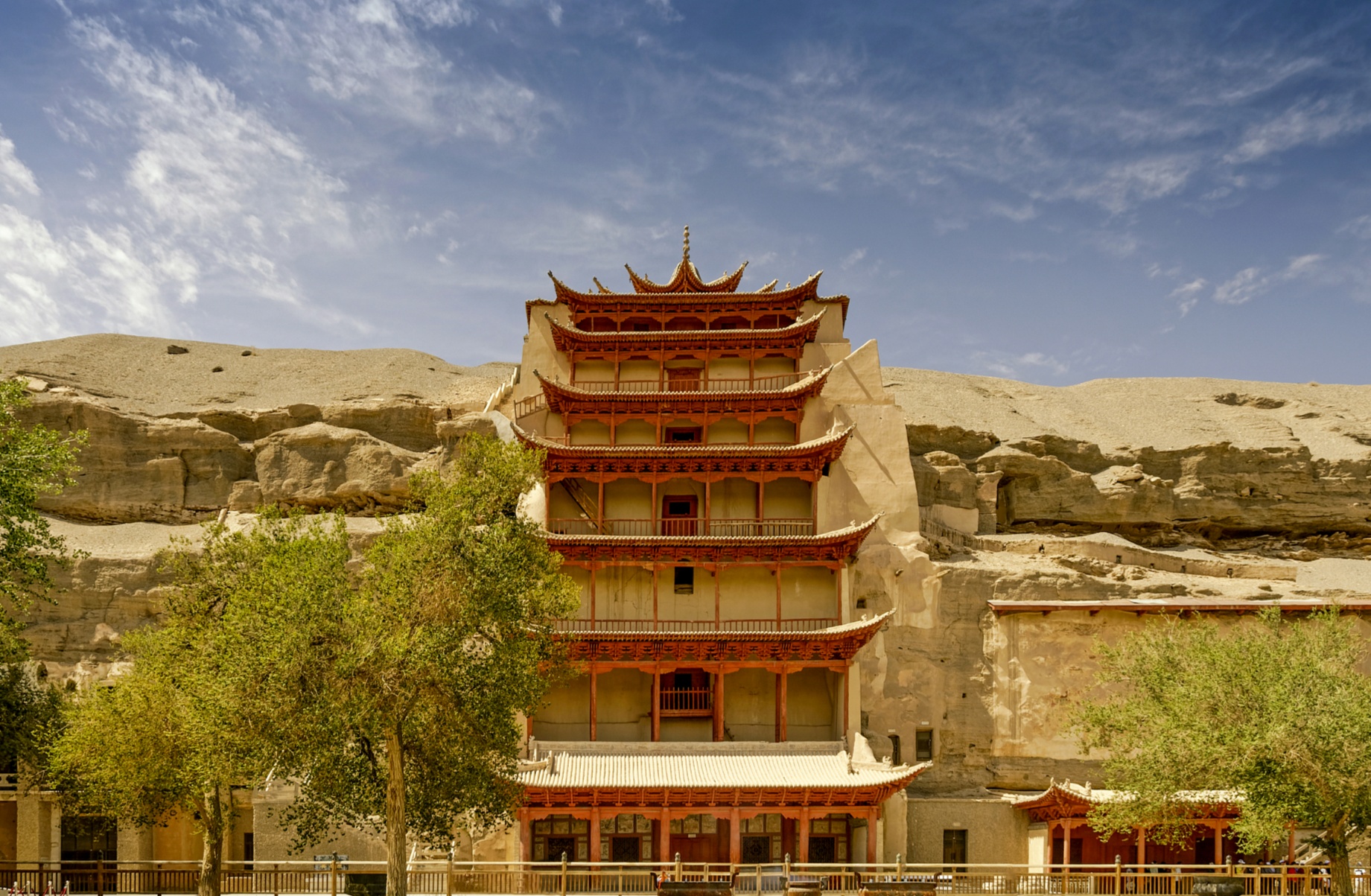
Jiuquan Yulinku.
By Train:
If you prefer rail travel, Jiuquan Railway Station serves as a good starting point. Trains from major cities like Lanzhou and Xi’an stop here. From the station, you can take a taxi or a local bus to reach Yulinku, which is roughly 75 kilometers (about 46 miles) away.
By Bus:
Long-distance buses operate frequently between Jiuquan and Yulinku. Buses from Jiuquan’s main bus station run directly to the Yulinku area, making it an economical choice for budget travelers. The bus ride takes approximately 1.5 to 2 hours.
Getting Around Yulinku
Once you arrive at Yulinku, the site is accessible on foot, but you should prepare for some walking, as the grottoes are spread out along the cliffs.
Guided Tours:
For a more informative experience, consider joining a guided tour. Many local operators offer tours that include transportation from Jiuquan or Dunhuang, which can enhance your visit by providing insights into the historical and cultural significance of the grottoes.
Car Rentals:
If you value flexibility and plan to explore the surrounding areas, renting a car is a viable option. Several rental agencies operate in Jiuquan and Dunhuang. Ensure you have an international driving permit if you are not a local driver.
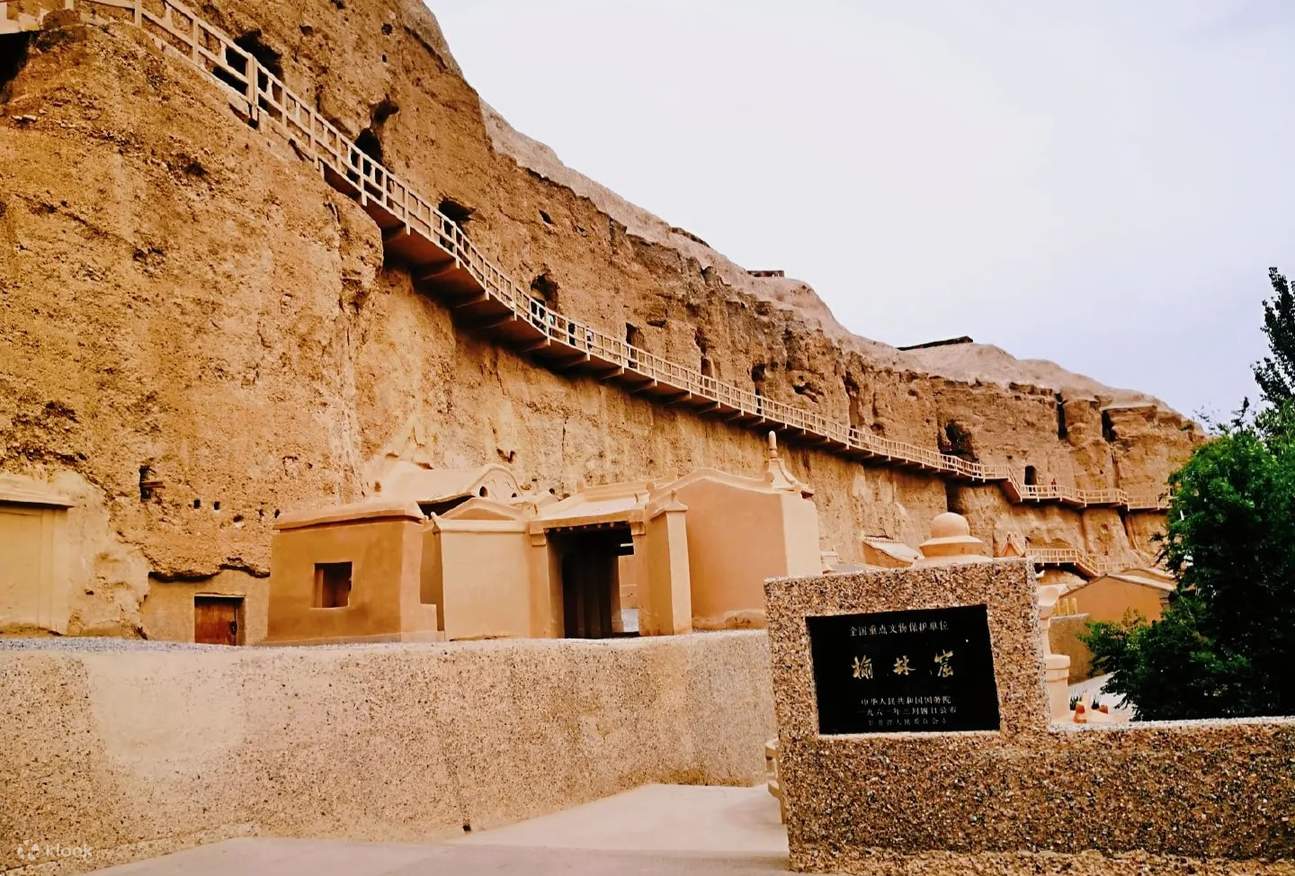
Jiuquan Yulinku.
Local Transportation:
Within Yulinku, there are often electric carts or shuttles available for visitors to help navigate between the various grottoes. These can be a convenient way to save energy for exploring the artwork and historical features.
Tips for a Smooth Journey
- Advance Booking: Especially during peak travel seasons, consider booking your transportation in advance to secure your seats, whether for flights, trains, or buses.
- Local Language: English may not be widely spoken, so having basic Mandarin phrases or a translation app can be beneficial.
- Weather Considerations: Yulinku is located in a desert region, which means it can be quite hot during the day and cooler at night. Dress appropriately and stay hydrated during your travels.
With these transportation options and tips, you’ll be well-prepared to explore the breathtaking artistry and history of Jiuquan Yulinku. Enjoy your journey!
Local Cuisine and Accommodation
When visiting the Jiuquan Yulinku (榆林窟), not only can you immerse yourself in the rich cultural heritage of the area, but you can also indulge in delightful local cuisine and enjoy comfortable accommodations. Here’s a guide to enhance your experience.
Culinary Delights
Exploring local flavors is an essential part of any journey, and the region surrounding Yulinku offers a variety of delicious dishes that reflect its rich cultural tapestry.
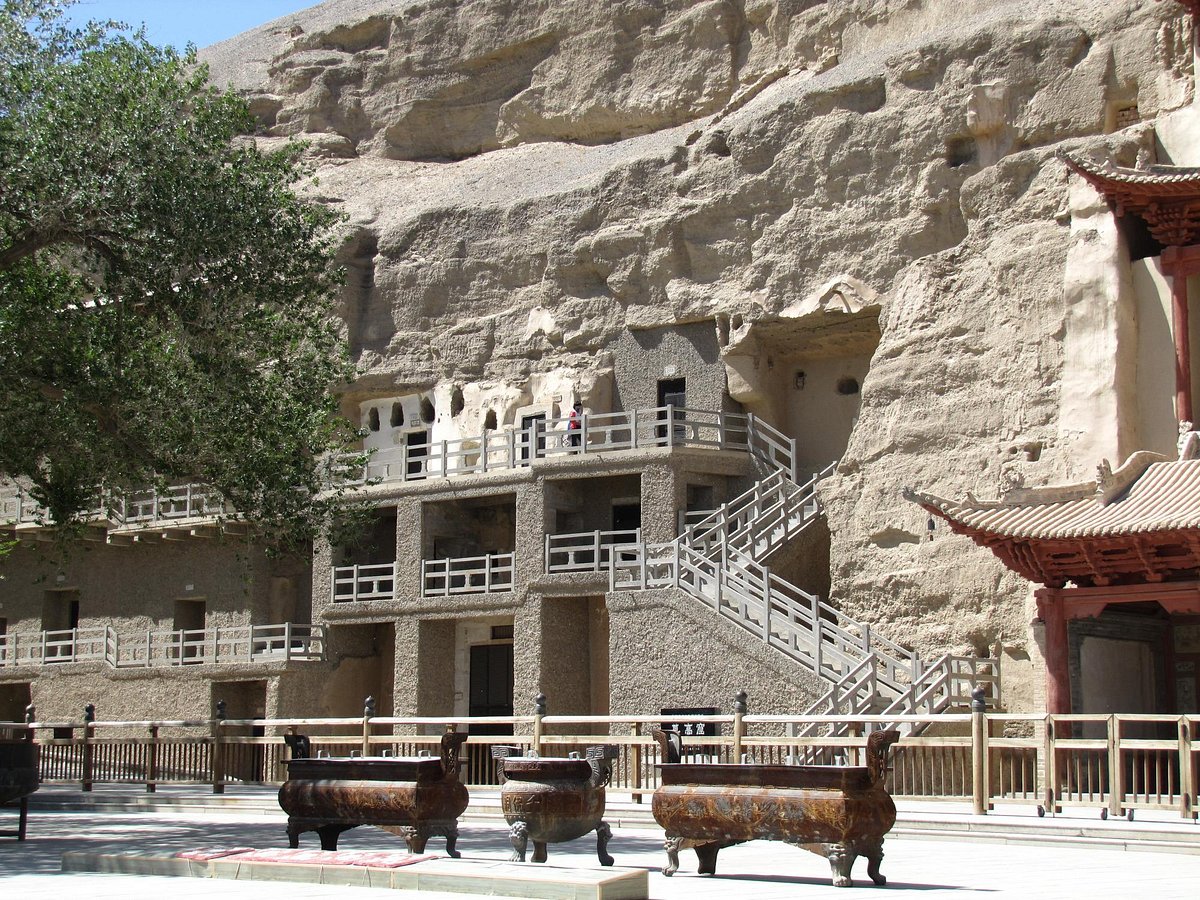
Jiuquan Yulinku.
-
Donkey Meat Noodles (驴肉黄面): A must-try, these chewy noodles are paired with tender, savory donkey meat and a rich sauce that will leave you wanting more. It’s a local specialty that perfectly encapsulates the flavors of the region.
-
Scallion Egg Stir-Fry (沙葱炒蛋): This simple yet flavorful dish features eggs cooked with fresh scallions. The dish is a hit among scallion lovers and is a great way to experience local produce.
-
Braised Lamb Buns (胡羊焖饼): Enjoy these soft, stuffed buns filled with succulent lamb that has soaked in rich broth. The result is a tender, flavorful meal that is comforting and satisfying.
-
Apricot Kernel Tea (杏皮茶): A refreshing beverage that serves as a perfect antidote to the dry, arid climate. This tea, reminiscent of a tart plum drink, is both delicious and revitalizing, making it a favorite among visitors.
-
Street Snacks: Don’t miss out on local street food vendors where you can savor sweet melons and crispy pastries. The affordability and flavor of these treats make them perfect for a quick bite while exploring.
Where to Stay
After a day of exploration, retreat to one of the welcoming accommodations in the area. Here are some recommendations that blend comfort with convenience:
- Guanzhou National Style Hotel (瓜州国风酒店):
- Location: Centrally situated in Guazhou County, making it easy to access major attractions like Yulinku and the local night markets.
- Design: The hotel features traditional Han and Tang architectural elements, providing a cultural ambiance that enhances your stay.
- Comfort: Rooms are spacious, with large windows allowing for natural light. Guests can expect soft bedding that promises a restful night.
-
Service: The staff is known for their helpfulness, often assisting with itinerary planning to ensure you make the most of your visit.
-
Dunhuang Fuyuan Hotel (敦煌富源酒店):
- Overview: A well-rated option that offers modern facilities and comforts.
- Accessibility: Located a short drive from major attractions, making it a convenient base for your adventures.
-
Amenities: Offers a restaurant with local cuisine, free Wi-Fi, and friendly staff to help you navigate the area.
-
Yulinku Guesthouse (榆林窟宾馆):
- Atmosphere: This guesthouse provides a cozy, home-like environment.
- Location: Located near Yulinku, it allows for easy access to the site.
- Experience: You can enjoy personalized service and local insights from the owners, enhancing your experience of the area.
Final Tips
When visiting Yulinku, consider booking your accommodations in advance, especially during peak travel seasons, to ensure you secure a spot that suits your needs. Additionally, exploring local eateries not only supports the community but also gives you a taste of the region’s unique culinary offerings. Enjoy your journey through this remarkable part of China!
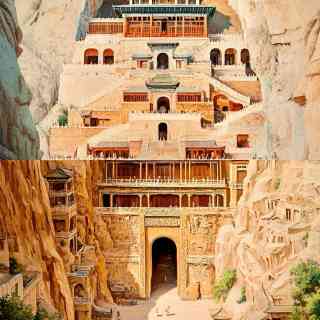
Jiuquan Yulinku.
Frequently Asked Questions
-
What are the opening hours for Jiuquan Yulinku?
The Yulinku Grottoes are generally open from 9:30 AM to 5:00 PM. It’s advisable to arrive early to fully explore the site. -
How much does it cost to visit Yulinku?
The entrance fee for the Yulinku Grottoes is approximately 40 CNY. There are additional charges for special grottoes, ranging from 100 to 200 CNY depending on your selections. -
How do I get to Yulinku from Dunhuang?
Yulinku is located about a two-hour drive from Dunhuang. Renting a car or hiring a driver is recommended for convenience. Public transportation may also be available, but it might require more time and transfers. -
Is there a guided tour available at Yulinku?
Yes, guided tours are available, and each visiting group typically has a guide who provides in-depth explanations of the grottoes and their historical significance. This enhances the overall experience, as the guides are knowledgeable and can answer questions. -
Are there any restrictions on photography within the grottoes?
Yes, photography is not allowed inside the grottoes to protect the ancient murals and sculptures from damage. Visitors are encouraged to respect this rule for the preservation of the site. -
What is the recommended time to spend at Yulinku?
It is recommended to allocate around 2-3 hours for your visit to fully appreciate the artistry and history of the grottoes without feeling rushed. -
What should I wear when visiting Yulinku?
Comfortable walking shoes are advisable, as the terrain can be uneven. Additionally, wearing layers is recommended due to variable weather conditions in the region. -
Are there food and restroom facilities available at Yulinku?
Basic restroom facilities are available at the site. However, it is advisable to bring snacks and water, as food options may be limited within the vicinity of the grottoes.
Final Thoughts on Your Trip
Visiting Jiuquan Yulinku (榆林窟) offers an unforgettable journey through time, where history, art, and spirituality converge in the breathtaking landscapes of Gansu Province. This lesser-known gem, often overshadowed by its famous sibling, the Mogao Caves, invites travelers to explore its meticulously preserved murals and sculptures, which tell stories of devotion and artistry that span centuries.
As you wander through the serene corridors of the caves, you’ll find yourself immersed in a world where ancient cultures and beliefs come alive, illuminated by the soft glow of artistry that has withstood the test of time. The peaceful surroundings of the Yulin River enhance the experience, providing a tranquil backdrop to contemplate the rich history of the Silk Road and the profound impact of Buddhism in this region.
Whether you’re a history enthusiast, an art lover, or simply seeking a unique travel experience, Yulinku promises a rewarding exploration. Its relatively low visitor numbers mean you can appreciate the beauty and significance of the site without the crowds, allowing for a more personal connection to this cultural treasure.
So, pack your bags and prepare to uncover the stories etched in stone at Yulinku, a place where every corner whispers the echoes of the past, waiting to inspire your spirit and ignite your imagination.
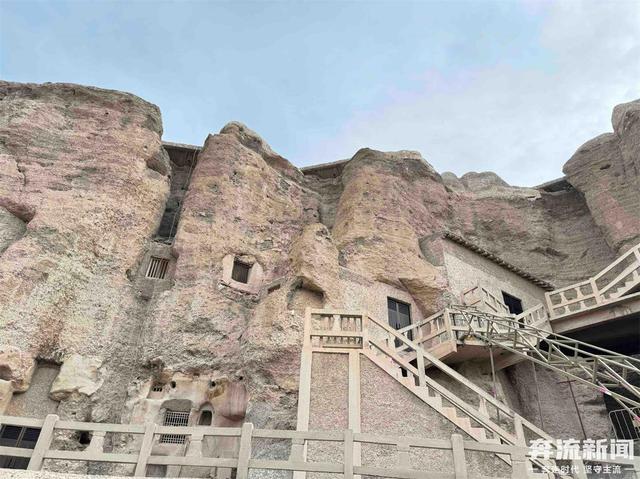
Jiuquan Yulinku.
